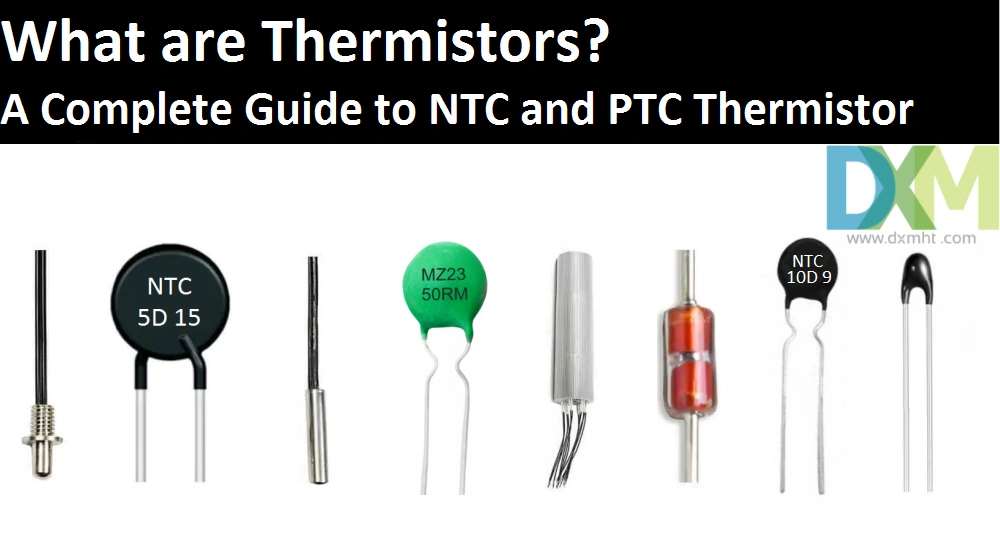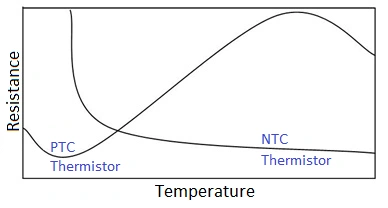What are Thermistors? A Complete Guide to NTC and PTC Thermistor for Temperature Control and Protection
Discover the world of thermistors with DXM, your leading source for advanced temperature sensing and controling solutions. "What are Thermistors?" explores the essential role of these thermal resistors in modern technology. Known for their precision, thermistors like the PTC thermistor, efficiently manage temperature changes in various applications. Uncover how DXM's expertise in thermistor technology can enhance performance and reliability in your systems. Stay ahead with our cutting-edge, customizable solutions designed to meet your specific needs.

What are Thermistors: Types and Functions
Thermistors come in two main types: NTC thermistor and PTC thermistor. NTC (Negative Temperature Coefficient) thermistors decrease in resistance as temperature increases, while PTC (Positive Temperature Coefficient) thermistors work the opposite way, increasing in resistance with rising temperatures.Thermistors, or Thermal Resistors, are key components in temperature-sensitive applications. These electronic devices are essential for temperature measurement and control, ensuring system reliability. Understanding what are thermistors is critical for testing and selecting the right type for your needs.
Both types are used across industries for applications such as monitoring, safety, and thermal protection. Selecting the correct thermistor ensures accurate temperature management in your system.
Testing a thermistor involves checking its resistance with a multimeter, as changes in temperature affect its readings. This helps verify its accuracy and functionality in various environments.
In conclusion, thermistors are invaluable for precise temperature control, whether you choose an NTC or PTC thermistor for your application. Understanding the basic function and testing methods allows you to make better choices for reliable system operation.
What are Thermistors: NTC vs. PTC Thermistor Explained
Thermistors, also known as Thermal Resistors, are critical in temperature-sensitive applications. Understanding what thermistors are is essential to selecting the right type for your system. Thermistors come in two main categories: NTC thermistor and PTC thermistor, each with unique characteristics.
NTC Thermistor (Negative Temperature Coefficient)
NTC thermistor lower its resistance as the temperature increases. Its primary uses include:
- Temperature Sensing: Providing accurate temperature measurements.
- Inrush Current Limiting: Controlling initial current surges in electronics.
- Temperature Compensation: Stabilizing circuits in changing thermal environments.
Due to their high sensitivity, NTC thermistor is found in automotive, industrial, and household devices.
PTC Thermistor (Positive Temperature Coefficient)
PTC thermistor increases resistance as temperatures rise. It is primarily used for:
- Overcurrent Protection: Safeguarding circuits from excessive current.
- Resettable Fuses: Resetting automatically after current overload.
- Self-Regulating Heaters: Maintaining stable heating in thermal systems.
PTC thermistor enhances system safety and protect sensitive components, ensuring reliability in electronic applications.
Understanding What are Thermistors especially the differences between NTC and PTC thermistor helps in optimizing temperature control and system protection.

The Importance of Thermal Resistors in Electronic Systems
What are Thermistors? These Thermal Resistors play a critical role in electronic systems, ensuring stability and safety by accurately responding to temperature changes. Whether it’s an NTC thermistor or a PTC thermistor, each serves a unique purpose in maintaining the optimal performance and longevity of devices.
Thermistors are essential for:
- Temperature Sensing: Providing precise monitoring in changing conditions.
- Overcurrent Protection: Safeguarding sensitive components from damage.
- Temperature Regulation: Stabilizing system performance under fluctuating temperatures.
By incorporating the right thermistor, whether NTC or PTC, systems can achieve enhanced reliability and protection, preventing failures and extending their operational lifespan.
Conclusion
Understanding what are thermistors is key to effectively testing Thermal Resistor. Thermistors, including both NTC thermistor and PTC thermistor, play a vital role in ensuring the efficiency and reliability of electronic systems.
By identifying the thermistor type and function, you can accurately test its resistance and verify performance. This ensures your system operates smoothly under changing thermal conditions, safeguarding against potential malfunctions.
Effective thermistor testing ensures stability, enhances protection, and optimizes overall system functionality.
Author: Ivan Huang
Recommended for you

What Is Positive Temperature Coefficient? Expert Guide on PTC Thermistors

Unlocking the 103 Capacitor: An Essential Guide for Professionals

Where Can I Buy Resistors? Your Expert Sourcing Guide

How to Find Impedance of a Capacitor: Guide for Professionals

how to calibrate rtd pt100?

Capacitor 104 Value: Essential Guide for Electronics Professionals
Price and Payment
Are invoices provided?
Yes, we provide legal invoices that can be used for reimbursement and accounting records.
Price
The price will be quoted in US dollars.
1) For small order quantities and small packing, normally our quotation is based on the ex-works price. The cargo will be delivered by courier after being finished normally.
2) For bulk orders and large volumes, normally our quotation is based on the FOB price. Please inform us of your destination seaport and estimated quantity, and our representative will quote you the C&F or CIF price accordingly. If you feel our freight is higher than your expectation, you can recommend your shipping company to us. Our principal is looking for a shipping company with a good reputation that offers competitive freight costs and can deliver your cargo promptly.
Logistics
Is your logistics and distribution service reliable?
Yes, we cooperate with a number of well-known logistics companies to ensure the timeliness and reliability of logistics and distribution services and provide you with a satisfactory distribution experience.
Does it support express delivery?
Yes, we support express delivery services. You can choose different delivery methods according to your needs, including ordinary express delivery and expedited express delivery.
How to track my order?
You can track your order through our official website or the order number provided and learn about the logistics status and delivery progress of your order at any time.
You may also like

PTC Resistors MZ71 Degauss Thermistor for TV monitor Degaussing

PTC Thermistor TV Degausser-Reliable MZ73 | DXM

PTC Elements for Telecom Termination MZ24 Series | DXM

PTC Termistor MZ31 Series: Reliable Overload Protection for Circuit Applications

PTC Thermal Resistor 19P for Overcurrent and Overload Protection

Linear PTC Thermistor Precision Temperature Sensing (KTY Series)

NTC Thermistor Inrush Current limiter MF72

Negative Temperature Coefficient Thermistor for temperature compensation (MF11 series)
Get in Touch
Discover premium thermistors, sensors, and resistors tailored to your needs.Our dedicated team of experts is available to assist with product selection, technical queries, and after-sales service. Contact us for custom solutions and experience exceptional customer support.
© 2025 DXM | All Rights Reserved.

 Scan QR Code
Scan QR Code
Scan QR Code
Whatsapp: +8618927361658
Shenzhen DXM Technology Co., Ltd.
DXM PTCNTC
Shenzhen DXM Technology Co., Ltd